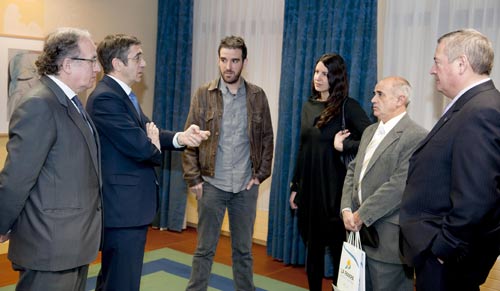basque heritage worldwide

03/07/2012

ADVERTISING
Vitoria-Gasteiz. March 6th was the debut, at least for the new euskal etxea representatives, at attended the first Advisory Committee meeting after being elected at the Fifth World Congress of Basque Collectivities last November in Donostia. They, along with their hosts, Guillermo Echenique, Secretary General of Foreign Action, and Julian Celaya, Director of Citizens and Basque Collectivities Abroad, were those most involved in this first meeting of this advisory body to the Lehendakari, along with other ex officio members of the agency, as the director of the Etxepare Basque Institute, Aizpea Goenaga, as well as a representative from Euskaltzaindia, Jose Luis Lizundia.
Prior to the meeting, the Lehendakari Patxi Lopez welcomed the council members Ricardo Basterra (Argentina), Adelaide Daraspe (Quebec) and Aitor Arruti (Barcelona), the three Basque club representatives, accompanied by Guillermo Echenique and Julian Celaya.
It is worth noting that this council is comprised of not only the three Basque club representatives, the Secretary General of Foreign Action and the Director of Citizens and Basque Collectivities Abroad, but that the Lehendakari himself also is part of the committee serving as its chair along with representatives of different departments of the Basque Government (finance, education, industry, employment, housing and culture), along with the Parliament and representatives from the Provincial Governments, as well as other notable institutions such as Euskaltzaindia, EUDEL (town halls) and the University of the Basque Country.
The Advisory Committee meeting ran from 10am to 1pm and reviewed each of the points approved at the Fifth World Congress that particularly influenced the Basque club representatives, with comments, clarifications and discussion on these. The committee gave itself a month to come up with a draft of the four-year plan that will be submitted to its members for review and approval.
As stated by the Basque Government, “we are still committed to the economic support of the Basque in spite of the current economic climate,” and while it will take some time, because of its implications “the administrative process will be simplified regarding grant management.”
Just as during the World Congress, researcher Dr. Pedro Oiarzabal represented the University of Deusto, and summarized the work done to date on a study commissioned by the Basque Government by a team led by himself who is studying Basques abroad, as well as returnees, or people of Basque origin who have returned to Euskadi and who need help in order to (re)establish themselves in areas of health, housing, and job training. This raises the need to rethink and implement a sort of administrative structure that would develop these areas of service established by the Basque Government relating to citizens and Basque collectivities including the returnees.
Other topics covered were the optimization of the use the internet and new technologies to connect with each other regarding the cultural tours program, which this year will face conflicts with unavoidable commitments, or Gaztemundu, of which a video of last year’s participants was shown.
ADVERTISING
ADVERTISING
ADVERTISING
ADVERTISING
ADVERTISING
© 2014 - 2019 Basque Heritage Elkartea
Bera Bera 73
20009 Donostia / San Sebastián
Tel: (+34) 943 316170
Email: info@euskalkultura.eus